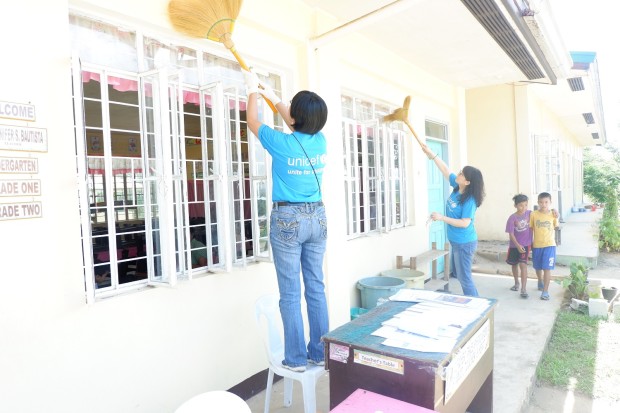
UNICEF education experts lead by chief of education Hideko Miyagawa clean off cobwebs from ceilings and walls of classrooms at Aguho Elementary School in Tanay, Rizal, as it joins Department of Education’s Brigada Eskwela.
UN children’s agency Unicef joined the Department of Education’s Brigada Eskwela campaign with a message to ensure that all children enjoy their right to learn. This year’s Brigada Eskwela theme calls for a united effort and shared community responsibility in making schools ready and safe for children.
The Philippines is one of the top countries in the world with the highest number of out-of-school children. The 2015 Philippine Out-of-School Children Study reveals that there are still 1.2 million out-of-school children ages 5-13 years old. The 2013 Functional Literacy, Education and Mass Media (FLEMMS) Survey reported 3.8 million out-of-of school children ages 6-24 years old.
Unicef has been working with government and other partners towards the creation of policies and programs promoting inclusive education. An education system that is inclusive ensures that the diversity of needs of all learners are addressed and exclusion is reduced.
“We appreciate the efforts of the government in advancing inclusive education in the entire school system by increasing the schools’ capacity to respond to diversity. Unicef will work hand in hand with the government to make sure that learners’ needs are recognized and addressed in the classrooms,” Unicef Philippines Representative Lotta Sylwander said.
In a clean-up drive in Sampaloc Elementary School, Unicef’s education experts led by Chief of Education Hideko Miyagawa joined in the painting and cleaning. The Southeast Asian Ministers of Education Organization Regional Center for Educational Innovation and Technology (SEAMEO-INNOTECH), Unicef’s partner in improving access and learning of disadvantaged learners, also joined.
Unicef under the leadership of the Department of Education and in collaboration with other education partners are working together to ensure all children, particularly children who are excluded because of disabilities, language, location and poverty, are in school and enjoy meaningful learning opportunities.
“We support the global thrust for inclusive education which eliminates discrimination and makes learning child-centered,” Miyagawa said. She noted that an inclusive learning environment celebrates diversity. Children can learn together better and learn from each other’s differences, and prepares them to create and live in a more inclusive society.
In an inclusive school environment, all children including those with disabilities learn together in the same classroom and are not segregated in a special class. Also, teachers treat each learner equally.